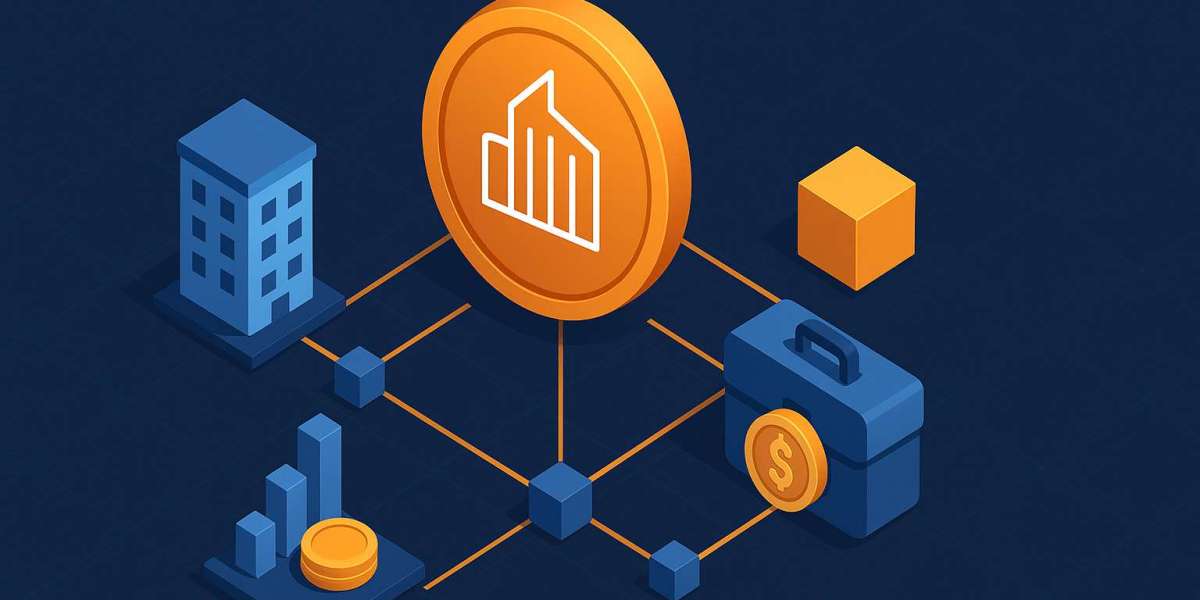The real estate sector is undergoing a digital revolution, and at the heart of this transformation lies a powerful combination—Artificial Intelligence (AI) and asset tokenization. Together, these technologies are reshaping how we buy, sell, manage, and invest in property. For real estate developers, investors, and platform operators, this evolution represents more than just innovation—it unlocks a new era of accessibility, transparency, and operational efficiency.
Smart real estate platforms powered by AI and tokenization are no longer just theoretical models. They are being built and adopted to enable fractional ownership, automated transactions, and intelligent investment strategies, all driven by data and blockchain infrastructure.
In this blog, we explore how AI and asset tokenization work together to build smarter, faster, and more scalable real estate platforms—and why businesses should take action now to capitalize on this shift.
1. Understanding the Foundations
1.1 What is Asset Tokenization in Real Estate?
Asset tokenization refers to the process of converting ownership rights in a real estate property into digital tokens on a blockchain. Each token represents a share in the asset and can be traded, held, or used as collateral.
Key benefits include:
- Fractional ownership: Enables smaller investors to participate in high-value properties.
- Enhanced liquidity: Real estate becomes tradable like stocks or crypto tokens.
- Transparency and security: Blockchain ensures immutable records of ownership and transactions.
- Reduced intermediaries: Transactions can be peer-to-peer, cutting down on legal and administrative costs.
Tokenization democratizes access to real estate investment and enables global participation, which is essential for platforms targeting both institutional and retail investors.
1.2 The Role of Artificial Intelligence in Real Estate
AI brings a layer of intelligence and automation that transforms raw data into actionable insights. In real estate, AI is used for:
- Market analysis and property valuation
- Automated tenant screening and lease management
- Predictive maintenance and energy optimization
- Streamlining compliance and risk assessment
By integrating AI, platforms can make smarter decisions, personalize experiences, and deliver faster services to both buyers and sellers.
2. The Synergy: AI Meets Asset Tokenization
The combination of AI and tokenization creates a dynamic infrastructure where digital assets are intelligently created, managed, and optimized in real time.
2.1 Smarter Asset Valuation and Due Diligence
One of the most crucial steps in real estate tokenization is accurate asset valuation. AI models can analyze:
- Comparable property data
- Rental yields
- Market trends
- Economic indicators
This provides real-time, unbiased property valuations that reflect current market conditions. AI also speeds up due diligence by scanning and verifying:
- Legal documents
- Title deeds
- Ownership histories
- Zoning laws
Through natural language processing (NLP) and optical character recognition (OCR), AI can extract and assess key data points from massive document sets, ensuring faster, more reliable compliance.
2.2 Enhancing Token Issuance and Structuring
AI streamlines token creation by helping platforms:
- Determine optimal token pricing based on demand and property performance
- Customize token allocation models (e.g., dividend-bearing vs. equity-based tokens)
- Predict investor behavior and personalize token offerings
For instance, if a platform notices that retail investors prefer shorter holding periods, AI can recommend structuring tokens with more frequent payout mechanisms. This level of customization enhances investor satisfaction and boosts engagement.
3. Streamlining Real Estate Transactions
AI not only helps in setting up tokenized real estate—it ensures the ongoing processes remain efficient and secure.
3.1 AI-Powered Smart Contracts and Workflow Automation
Smart contracts automate the execution of agreements when preset conditions are met. With AI embedded, these contracts can:
- Dynamically adjust rental terms based on market fluctuations
- Trigger maintenance or inspection requests based on sensor data
- Handle complex royalty and distribution logic for fractional owners
By eliminating manual intervention, smart contracts reduce processing times, minimize errors, and create a self-sustaining ecosystem for tokenized assets.
3.2 AI-Enabled Investor Onboarding and KYC
Investor onboarding can be cumbersome, especially in regulated markets. AI optimizes the Know Your Customer (KYC) and Anti-Money Laundering (AML) checks by:
- Verifying documents in real time
- Cross-referencing identities with government databases
- Scoring investor risk profiles for compliance
With machine learning algorithms, platforms can adapt to different jurisdictions and regulatory environments seamlessly, allowing for borderless onboarding with full compliance.
4. Intelligent Market Insights and Portfolio Management
AI empowers investors and platform operators with the intelligence to make smarter decisions and manage portfolios more effectively.
4.1 Predictive Analytics for Smarter Investment Decisions
AI tools can analyze market signals, historical data, and investor sentiment to predict:
- Property appreciation potential
- Rental income stability
- Risk exposure based on geographic or economic factors
This enables data-driven investment strategies where users receive tailored suggestions aligned with their risk appetite and investment goals.
Example: An investor looking for short-term gains may be directed toward high-demand rental units in urban centers, while a long-term investor could be guided toward appreciating suburban developments.
4.2 Dynamic Asset Monitoring and Performance Tracking
With real-time data streaming from tokenized assets, AI dashboards provide:
- Live tracking of token prices and trade volume
- Rental income reports and maintenance costs
- Alerts for underperforming assets or irregularities
These insights help investors rebalance their portfolios or reinvest dividends with confidence and speed—without relying on manual portfolio analysis.
5. Real-World Use Cases and Platform Examples
AI-powered tokenization isn’t just theoretical—it’s already being implemented in various real estate platforms around the globe.
5.1 AI-Driven Tokenization in Urban Real Estate Projects
Some smart city initiatives are leveraging AI and tokenization to:
- Crowdfund infrastructure and housing development
- Monitor construction progress using computer vision
- Manage investor engagement through AI chatbots
Example: A mixed-use development may tokenize retail space and residential units separately, offering AI-optimized returns based on tenant performance and area foot traffic.
5.2 Decentralized Real Estate Marketplaces Powered by AI
Platforms are emerging that offer:
- Peer-to-peer token trading
- AI-powered property discovery and matchmaking
- Instantaneous liquidity through integrated DeFi protocols
These marketplaces make real estate as easy to trade as crypto tokens, offering global exposure and AI-driven decision-making to every participant.
6. Key Benefits for Stakeholders
6.1 For Developers and Real Estate Firms
- Access to global capital through token sales
- Automated asset and tenant management
- Reduced overhead through smart contract workflows
6.2 For Investors and Asset Managers
- Lower barriers to entry with fractional investment
- Greater liquidity and control over real estate portfolios
- Personalized investment strategies powered by AI
6.3 For Platform Operators
- Scalable systems that grow with demand
- Streamlined compliance and onboarding
- Rich data insights for user engagement and optimization
7. Getting Started: Building a Smart Real Estate Tokenization Platform
For developers and entrepreneurs ready to capitalize on this trend, here’s how to launch a successful platform:
7.1 Essential Tech Stack and Components
- Blockchain layer: Ethereum, Polygon, or a private chain
- Tokenization engine: To manage issuance, distribution, and compliance
- AI modules: For valuation, KYC/AML, portfolio management
- Smart contracts: For rentals, distributions, and governance
- User interface: Intuitive dashboard with AI insights
The integration of these elements creates a frictionless experience for all participants, from token creators to global investors.
7.2 Steps to Launch and Scale a Smart Platform
- Define business model and compliance framework
- Develop and test AI-driven tokenization workflows
- Deploy MVP with core AI modules (e.g., onboarding, valuation)
- Onboard strategic investors and tokenized properties
- Leverage AI analytics to refine user experience and scale globally
Conclusion: Shaping the Future of Real Estate—Today
AI and tokenization aren’t futuristic concepts—they are shaping the present of real estate. For innovators and investors alike, this convergence presents a rare opportunity to transform the industry’s core systems.
By adopting AI-powered asset tokenization, smart real estate platforms gain the tools to:
- Expand access to property investment
- Boost transaction speed and trust
- Deliver personalized, data-driven experiences
Now is the time to act. Whether you're a developer, investor, or platform builder, integrating AI and tokenization into your real estate strategy isn't just smart—it's essential.
Key Takeaways
- AI + Tokenization enables faster, safer, and smarter real estate investments.
- Stakeholders gain transparency, efficiency, and personalization.
- Real-world platforms are already proving the model works.
- A smart real estate platform built today will lead tomorrow’s market.


